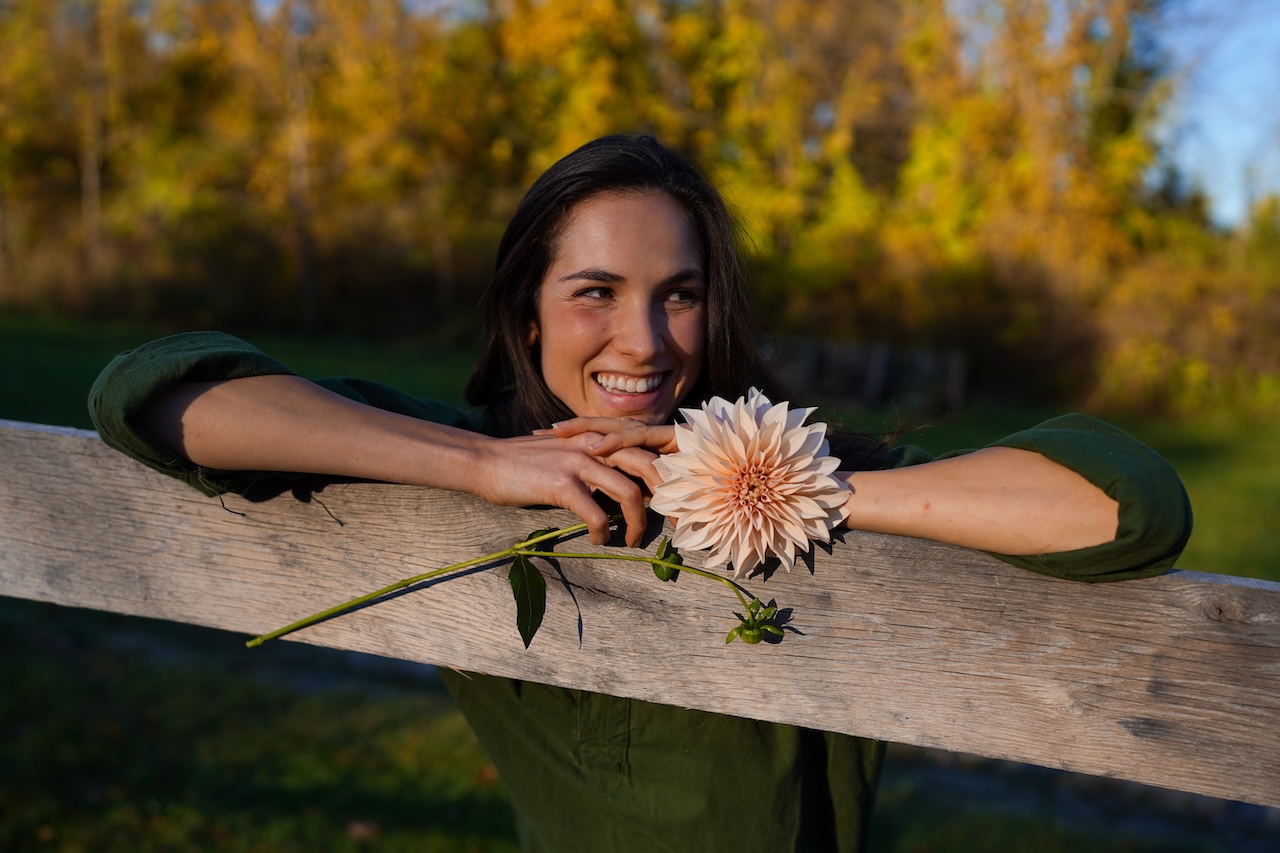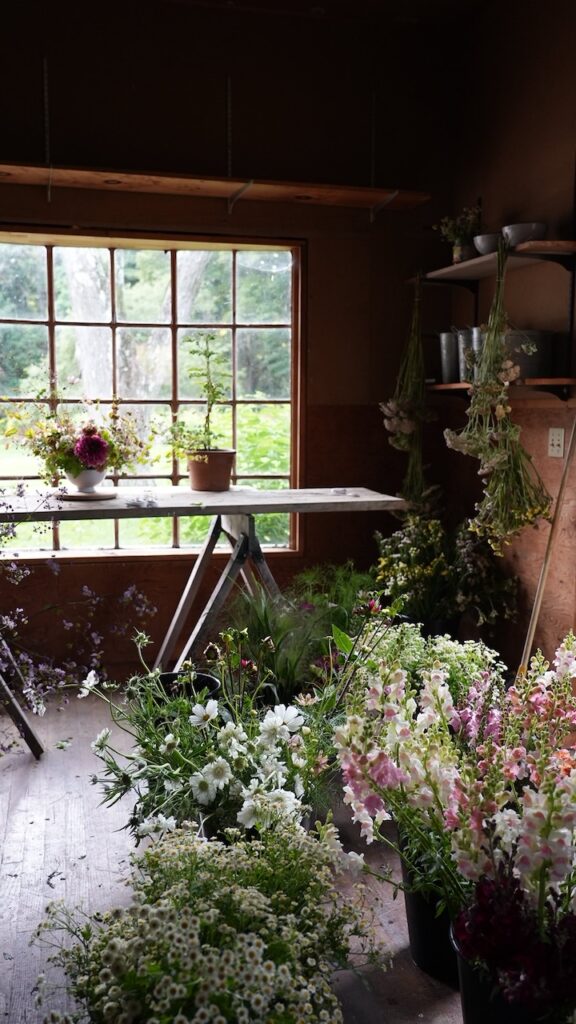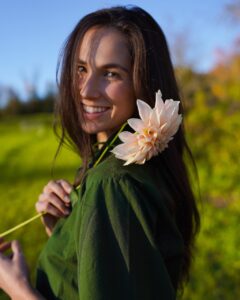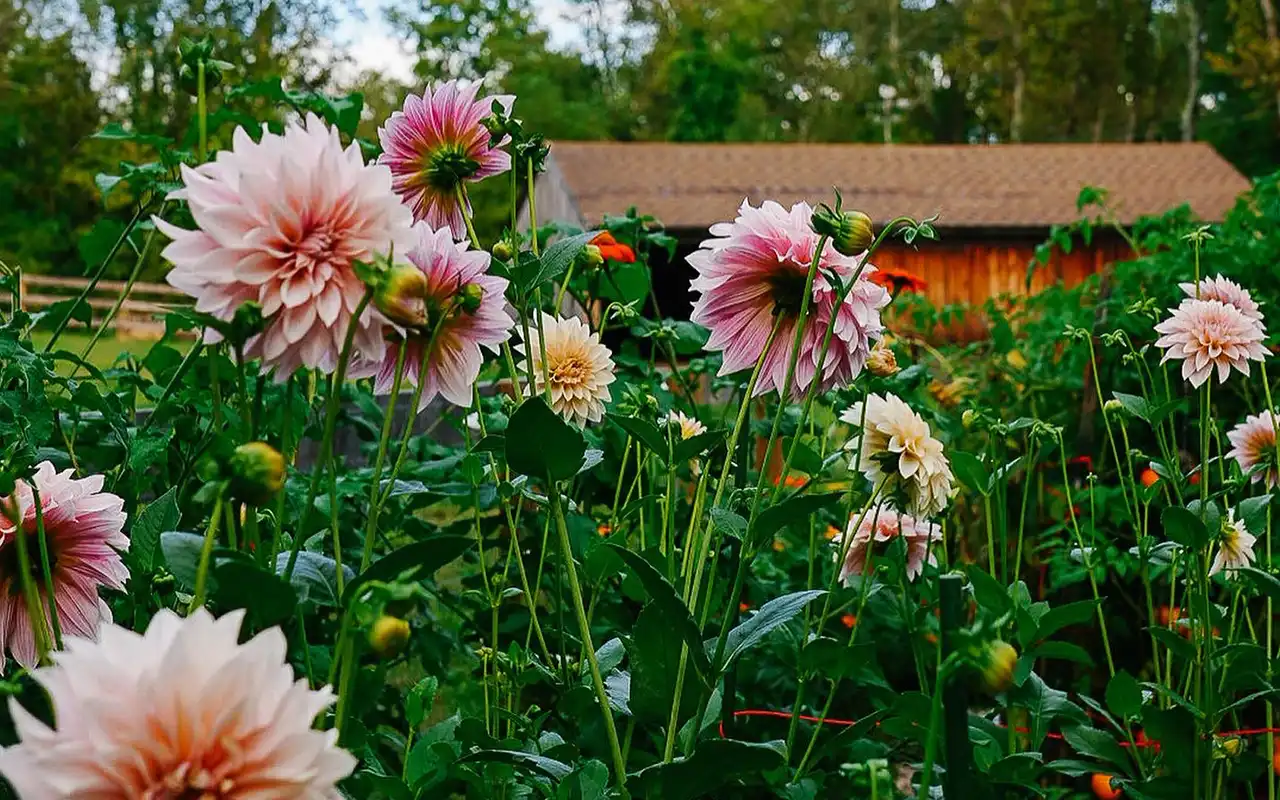This Month’s Featured Article

Le Jardin Flower Farm Emphasizes Effortless Floral Design
Originally from France, Romane Recalde moved to the United States to pursue a career in modeling. After the pandemic, she and her husband moved upstate and planted their roots – pun intended – in Amenia, NY.
“We moved here because this area reminds me so much of home,” Romane said. “I grew up in the remote French countryside outside of Bordeaux. The nearest village has a population of 600 people. Our garden at home was wild and natural, so when we moved here, I found myself wanting to recreate the garden I grew up in.”
The only problem was that Romane had never gardened before and didn’t know where to start. “My parents were more of the ‘plant it and cross your fingers’ type,” she mused. When she and her husband first moved into their home, she decided to plant a few flowers and start small. 
“I planted things that I remembered surrounding me as a child. I’d never paid much attention to the plants back then, but now, they felt so comforting to have by my side, thousands of miles away from where I grew up.”
Romane shared that her mother would pick lilacs and red roses, so those were the flowers that she planted first. Very quickly, she got the hang of gardening and became addicted to the process. The following year, she decided to start a flower farm and named it after her childhood garden: Le Jardin.
“I realized I knew nothing and wanted to learn as much as possible about growing flowers, so I started helping at a local farm for the summer. I took intensive online courses on flower farming, read every book on regenerative farming and soil health, and decided to give it a go!” she said. “I killed a lot of plants, but I was also rewarded by arm loads of incredible blooms. The satisfaction of seeing something grow before your eyes had me hooked!”
Services offered
Le Jardin offers floral design for weddings and events, and they also host workshops at the farm, private workshops at people’s homes, and frequent farmer’s markets in the area.
Romane also sells her flowers to florists in the area. Additionally, Le Jardin offers weekly flower deliveries to people’s homes for various events, such as centerpieces for dinner parties.
“We underestimated how large of a demand there was for this and it’s become a big part of our business,” she said. “With that in mind, our business is growing and we’re looking to hire – so if you love flowers and working with nature, reach out!”
 Regenerative farming and the weather
Regenerative farming and the weather
At Le Jardin, Romane’s goal is to disturb the soil as little as possible. She practices a no-till method and adds plenty of organic matter to the beds through cover crops and compost. She also doesn’t use synthetic or chemical fertilizers.
When terminating crops, she also leaves as many roots as possible. “I cut everything at the base, which takes a lot longer, but it’s important to leave the roots in the soil because they help feed the microbiome.”
She did an experiment a few seasons ago where she pulled roots out of half of the field and left them intact in the other half. The side where she didn’t pull the roots had an abundance of worms – which is indicative of healthy soil – whereas the other side of the field had very few worms throughout.
“My goal is to leave the soil in a better condition than I found it,” she said.
Right now, Romane is busy sowing seeds, prepping the beds, and getting plants in the ground. If she’s not working in the field, she’s typically doing weekly flower deliveries or arranging flowers for dinner parties, weddings, or other events.
As the weather gets warmer and spring transitions to summer, she’ll be busy harvesting all of the work that she’s putting in now. “It’s high season for weddings too, so weekends are busy! On top of that, we also do farmer’s markets and workshops.”
The weather has been a learning curve for Romane. The first year she started the farm, the Northeast suffered from a lengthy drought that left her dahlias looking wilty and sad. Last year, however, with all of the rain, they grew to be over seven feet tall and were very healthy and vibrant.
“You can’t control the weather. You just have to do your best with it, which is why I believe in regenerative farming: it helps the soil retain that moisture. Investing in the soil is the best way to adapt to weather change,” she explained. “Some things that worked last year didn’t work the year before. It’s about learning to let go of what you can’t control.”
Events and workshops
During the summer, Romane hosts a variety of flower-arranging workshops at the farm, where she teaches her naturalistic approach to floral design.
“I love arrangements that feel wild and whimsical, like they’ve just been picked from the garden – because they have!” she said. “My favorite workshops are those we host at the farm in Amenia. Guests can experience the magic of this place, walk amongst the flowers, and say hi to the donkeys.”
She’s also currently in the process of renovating a floral design studio on Main Street in Amenia where she plans to host workshops and meet with clients to design their dream weddings and events. The studio, also called Le Jardin, is set to open sometime in late spring.
Romane is also hosting a Mother’s Day flowering-arranging workshop at the Kent Flower Market on Saturday, May 11, and a dahlia workshop at the farm on August 18.
For Romane, the most rewarding part about being a flower farmer is seeing people’s reactions to the flowers. “Whether it’s a simple bunch of fragrant sweet peas or a giant dahlia as big as my head, people’s eyes light up with a special twinkle that brings me so much joy,” she shared.
She also values working outside and spending time in nature. “It helps me space out and calm my nervous system down.”
Working with nature is hard in any capacity. Romane notes that the most challenging part of working with flowers is that they are delicate and perishable. “Sometimes it can feel like a rush to get everything picked at the perfect stage and into the customer’s hand,” she said. “But that is also the beauty of it – the journey and love that goes into each seed until the time it blooms for that one week we enjoy it.”
Floral design
Romane approaches floral design with an organic attitude. She prefers wild and natural designs that look airy and effortless. She wants her designs to be a reflection of how things grow in nature, with lots of movement and texture, and even occasionally incorporating fun elements like unripe raspberries or small green tomatoes.
Her approach is anything but traditional, and she likes it that way. “You’re making something out of nothing and creating art out of these living plants. It’s a little moment of time, and then it’s gone,” she said. “I use whatever is available to me in the garden and what is in season. I like my designs to feel textured and natural.”
Taking a more effortless approach also allows her to utilize flowers with “wonky” stems or an unusual shape that otherwise wouldn’t be included in a traditional arrangement. “Our attention to detail is reflected in every aspect of what we do, from the daintiest flower crown to a show-stopping arbor.”
Looking ahead
Romane plans to continue growing the floral design aspect of her business for weddings and events by creating natural florals that “you can’t find with any other designer.”
“We grow 95% of our flowers, which is what makes us special,” she said. “It gives us an advantage in always having access to special materials that we wouldn’t be able to find otherwise, and that makes our designs stand out.”
Long-term, Romane also wants to open a flower shop, ideally in Amenia, as well as host retreats at the farm that blend wellness with floral design.
“I’m super into wellness and spirituality, and I think that flowers encompass that feeling. They have a very healing energy when you’re around them or working with them.” •
To learn more about Le Jardin Flower Farm, visit its website lejardinflowerfarm.com, or follow it on Instagram @lejardinflowerfarm.



